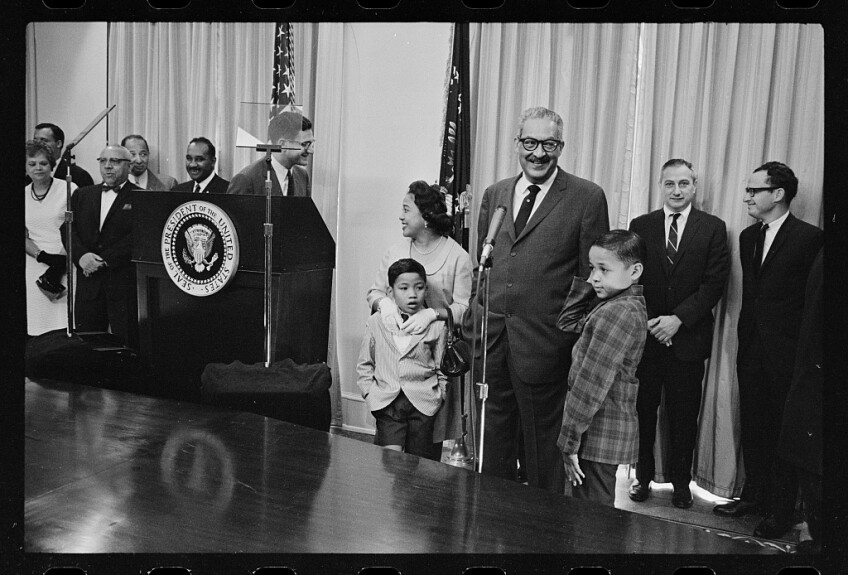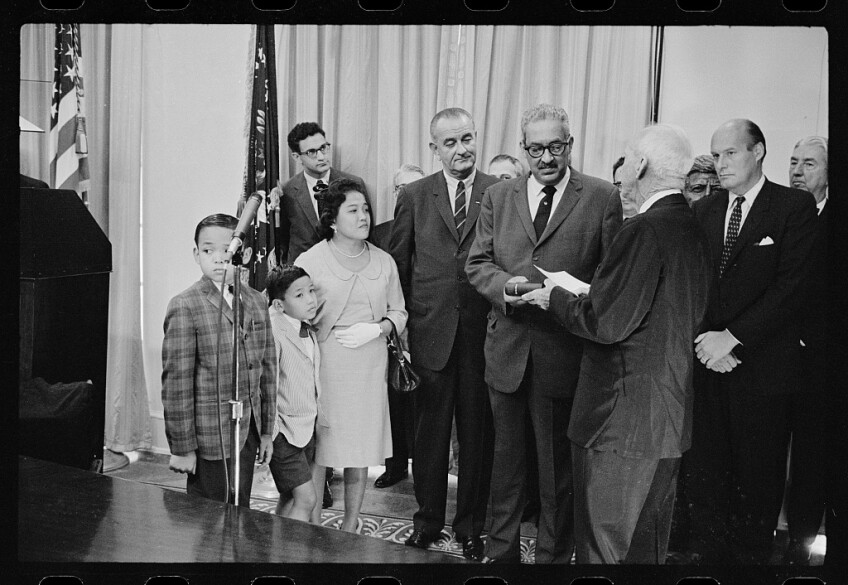How One O.C. Woman Took Her Fight For Fair Housing All The Way to the Supreme Court – And Won

Growing up in Kentucky coal country, Dorothy J. Mulkey always displayed a fierce sense of independence. “When I’m 18 I’m out of here,” she told her mother. “This isn’t my cup of tea; I don’t want to drink it anymore.” Indeed, when of age, she joined the armed services, “Navy blue was more flattering than Army brown” she told the Santa Ana Oral History Project in 2015. Once her Naval enlistment ended, she packed her bags and with her husband moved West to California.[1]
They settled in Santa Ana, where her husband had family and “opportunities were great,” she remembered. When her father-in-law told her that the local banks didn’t hire African Americans, she subsequently marched down to the Bank of America and got a job; she later found work for Pacific Bell in telecommunications where she would spend the rest of her professional life. Limits did not exist for Mulkey. “There was not a script to what I can’t do, so if there’s no script, then I can do it,” she told interviewers.[2]
The Mulkeys arrived in California at the same time the state and the nation were coming to grips with housing segregation. Fueled by World War II and the vast military investment that came to the region during the Cold War, the Great Migration enacted demographic shifts, which brought millions of African Americans to California and other states in the North and West. Increasing numbers of African-American families like the Mulkeys put down roots in the Golden State, but, as new apartments and subdivisions arose in the glow of postwar prosperity, many whites wanted to seal off their communities from minorities.
Dorothy Mulkey did not suffer fools or foolish referendums that cast her as a “third class citizen instead of a first class citizen.”
To stymie housing discrimination in both apartment rentals and home ownership, the California state legislature passed the 1963 Rumford Act. In truth, the law only affected a fraction of the state’s housing. One study argued that the legislation impacted only one quarter of the state’s 3.8 million homes and no more than five percent of the 857,000 rentals consisting of duplexes, triplexes and fourplexes. According to historian Daniel Martinez Hosang, who has written extensively on California housing and referendums, “most individual homeowners remained entirely unaffected by the provision of the Rumford Act; none of their ‘rights’ were abridged by its provisions.”[3]
Whatever the act’s actual impact, white Californians responded with fury, passing Proposition 14, a referendum that sought to not only undue the protection of the legislation but also previous fair housing provisions passed in the late 1950s. “[E]ven the most cautious and pessimistic [open housing advocate] had not anticipated such a major defeat,” prominent fair housing proponent Edward Rutledge noted after Proposition 14’s passage.[4] A very vocal campaign opposing the referendum that included Republicans like Casper Weinberger, celebrities such as Lucille Ball, and professional groups lawyers, doctors, and others could not prevent the referendum from passing.
And yet Dorothy Mulkey did not suffer fools or foolish referendums that cast her as a “third class citizen instead of a first class citizen.”[5]
When the Mulkeys were unfairly denied a rental in a new Santa Ana apartment complex, they – with the help of the NAACP – took their case to the judiciary, eventually reaching the Supreme Court. There, in a landmark 1967 decision, Byron White and four other justices ruled in favor of the Mulkeys, striking down Proposition 14.

1966-67
Fair housing advocates viewed the Mulkeys’ case, Reitman v. Mulkey, as a promising sign of things to come. The aforementioned Edward Rutledge and Jack E. Wood, both officials in the National Commission against Discrimination in Housing, believed 1967 to be the year of fair housing. “115 million Americans now live in states or localities which have laws barring discrimination in housing,” they told Washington Post reporter David Broder. “At least as many local laws were adopted in 1967 as were adopted in the entire 9 year period since NYC law, first in the nation, went into effect in 1958.”[6] (California followed soon after with the Unruh Civil Rights and Hawkins Acts of 1959.)
The Mulkey case represented definitive hope to fair housing advocates. With the expansion of state fair housing legislation across the country the U.S. Supreme Court’s decision to hear Reitman v. Mulkey, would make 1967 “a landmark year on the open housing issue,” Rutledge and Wood argued.[7]
In 1967, the journey to more equitable housing ran through Dorothy Mulkey. When confronted with discrimination, Mulkey did not hesitate. “I was never one to back down from a problem,” she said years later. “I didn’t have a second thought about [what] the next step would be … doing nothing was not an option.” When a local trial court ruled against them “all the big lawyers” from the NAACP and ACLU reached out to the couple, realizing the case’s importance. The Mulkeys soon teamed up with the local NAACP. “[L]ots of highly intelligent lawyers … gave their time because they knew it would be a landmark case,” she noted.[8]
In 1963, most blacks in Orange County did not live outside what was known as Little Texas, a Santa Ana “neighborhood [consisting] of pastel bungalows and cottages.” African-American homeowners were hemmed in “by real estate agents and police officers who held the border against black residents foolish enough to rent a house, order a vodka tonic or cruise down a traffic circle in the wrong neighborhood,” Los Angeles Times journalist Doreen Carvajal wrote in 1994.[9] Reitman v. Mulkey sought to dismantle such barriers.


Even though the California Supreme Court had declared Proposition 14 invalid in 1966, it was appealed to the U.S. Supreme Court and included in that court’s 1966 October term (which ran through June 1967). At the same time, numerous other states had passed like-minded referendums that more or less protected discriminatory housing practices. Closer to home, Democrat Sam Yorty railed against the decision in his 1966 campaign for mayor. Republican Ronald Reagan likewise used it as a whipping post in his successful gubernatorial campaign. The Rumford Act, Proposition 14, and the idea of “homeowner’s rights” played no part in Reagan’s famous 1964 “A Time for Choosing” speech that brought him to national regard; two years later however, it served as a rallying cry:[10] “I have never believed majority rule has the right to impose on an individual as to what he does with his property. This has nothing to do with discrimination. It has to do with our freedom, our basic freedom,” he would tell audiences.[11]
Reitman v. Mulkey would be one of the Warren Court’s last civil rights rulings. Chief Justice Earl Warren, the former California attorney general and governor, retired two years later. Yet even as the chief justice prepared to exit stage right, a future justice appeared before the court. As solicitor general, Thurgood Marshall argued the case for the federal government in favor of the Mulkeys. Proposition 14 “is, we believe, demonstrably an exercise of State power in support of racial discrimination. It must, therefore, fall in the face of the Equal protection clause,” he wrote in a draft of his courtroom argument.[12] In a 5-4 opinion authored by Justice Byron White, the court affirmed the California Supreme Court’s ruling and declared Proposition 14 unconstitutional. In a concurring opinion Justice William Douglas cut to the heart of the matter writing that the ballot measure was “a form of sophisticated discrimination” which enabled Californians “to harness the energies of private groups to do indirectly what they cannot under our decision allow their government to do.”[13]
Explore some of the spaces in Orange County shaped by conservatism and activism. Click on the starred map points to read more in-depth stories.
Throughout the case, however, the Mulkeys never made a court appearance. It took four years for the case to wind its way through the judicial system before reaching Supreme Court. In the meantime, they had already moved into a different apartment; the landlord of a nearby complex realized their case would ultimately prevail.[14]



The Mixed Results
The Mulkeys’ victory sealed the fate of Proposition 14. Governor Reagan never made any actual effort to resurrect it. However, its successful passage and the rhetoric deployed by Reagan established the groundwork for a homeowner’s rights movement that remains with us today. Warren Court decisions on crime and race, like Reitman v. Mulkey, enabled conservatives such as Barry Goldwater, Reagan, and Richard Nixon to chip away at the Democratic party’s base of northern white ethnics and southern white voters behind the language of property rights and free markets. [15] Southern California arguably pioneered this strain of conservative politics of the late 20th century.
Dorthoy Mulkey’s 1967 victory mattered.
Proposition 14 proponents harnessed anti-discrimination language of the civil rights movement in the name of property rights – often in order to enforce discriminatory practices. Prior to Proposition 14, writes Hosang “the large majority of elected officials were unwilling to assert that a right to discriminate existed, in the wake of [the referendum’s] overwhelming passage they eagerly embraced this opinion.”
The language of “homeowner’s rights” served as coda for a white identity that need not mention race. Nixon deployed similar rhetoric in his rise to the presidency; Reagan would do the same a decade and a half later. Under such rubrics, discrimination in housing did not flow from structural inequality, but rather personal bigotry. The 1968 Fair Housing Act rightly declared such discrimination illegal but never put into place any real provisions for dismantling the structural inequality that had created segregation.
Dorthoy Mulkey’s 1967 victory mattered. It overturned a horrible referendum and enabled thousands of minorities to move into communities previously deemed off limits. Yet it proved just one victory in a long road toward housing equality.
“Our goal was to move into a place not go to the [the Supreme Court],” Dorothy recounted years later. “All we wanted was a place to live, a decent place, we thought we deserved that.” Indeed, they did.
Notes
[1] Dorothy Mulkey, interview with Santa Ana Oral History Project, December 13, 2015, https://www.youtube.com/watch?v=YoaFdCfyAkg&list=PLuXEcCp7eWwnWOwbiqc-pSIJ0eFhgSUea
[2] Dorothy Mulkey, interview with Santa Ana Oral History Project, December 13, 2015, https://www.youtube.com/watch?v=YoaFdCfyAkg&list=PLuXEcCp7eWwnWOwbiqc-pSIJ0eFhgSUea
[3] Daniel Martinez HoSang, Racial Propositions: Ballot Initiatives and the Making of Postwar California, (Los Angeles: University of California Press, 2010), 62-63.
[4] HoSang, Racial Propositions, 85.
[5] Dorothy Mulkey, interview with Orange County Human Relations Organization, May 8, 2014, https://www.youtube.com/watch?v=V_Tu7WuEQwM
[6] Edward Rutledge and Jack E. Wood, interview with David Broder, 1967, David Broder Papers, Manuscript Division, Library of Congress.
[7] Edward Rutledge and Jack E. Wood, interview with David Broder, 1967, David Broder Papers, Manuscript Division, Library of Congress.
[8] Dorothy Mulkey, interview with Santa Ana Oral History Project, December 13, 2015, https://www.youtube.com/watch?v=YoaFdCfyAkg&list=PLuXEcCp7eWwnWOwbiqc-pSIJ0eFhgSUea
[9] Doreen Carvajal, “Bittersweet Nostalgia: Housing Gains Disbanded Much of Santa Ana’s Black Community,” January 30, 1994, http://articles.latimes.com/1994-01-30/local/me-17103_1_santa-ana
[10] HoSang, Racial Propositions, 72.
[11] Rick Perlstein, Nixonland: The Rise of a President and the Fracturing of America, (New York: Scribner, 2008), 91.
[12] Thurgood Marshall, draft of court arguments in Reitman v. Mulkey with hand edits, October Term 1966, Thurgood Marshall Papers, Library of Congress.
[13] HoSang, Racial Propositions, 87.
[14] Dorothy Mulkey, interview with Santa Ana Oral History Project, December 13, 2015, https://www.youtube.com/watch?v=YoaFdCfyAkg&list=PLuXEcCp7eWwnWOwbiqc-pSIJ0eFhgSUea.
[15] Seth Stern and Stephen Wermeil, Justice Brennan: Liberal Champion, (New York: Houghton Mifflin Harcourt, 2010), 317; Lisa McGirr, Suburban Warriors: The Origins of the New American Right, (Princeton: Princeton University Press, 2002); Matthew Lassiter, The Silent Majority: Suburban Politics in the Sunbelt South, (Princeton: Princeton University Press, 2007)